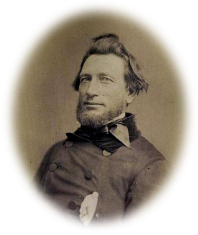On Board Ocean Steamer Arago,”
In Chesapeake Bay.
August 23rd.–We have now, at least for the present, bid farewell to “the Peninsula,” the land of blasted hopes, the place of our disappointments, the hot-bed of disgrace to the finest army of modern times. General Pope having drawn off the rebel army to give us an opportunity to escape from our perilous position, we passed from Harrison’s Point to Hampton without a fight or without a hostile gun being fired. Never since the retreat of Napoleon from Moscow, has there been so disgraceful a failure as this Peninsula campaign indeed, not then. For, although Napoleon failed in the object of his enterprise, before he retreated he saw the Russian Capital in flames and his enemy abandon his stronghold, whilst we witnessed the daily strengthening of the enemy’s capital, and were driven out of the country we went to chastise, without having accomplished a single object of our visit.
Our destination is not yet revealed to us. We suppose it to be Aquia Creek, thence to reinforce General Pope, but I fear it will be such a reinforcement as will not benefit the country or raise the reputation of our already disgraced army.
The jealousy of our commanders towards General Pope is so intense, that if I mistake not, it will, on the first occasion, “crop out” in such form as shall damage our cause more than all the cowardice, incompetency and drunkenness which have so far disgraced our campaigns. General Pope’s advance proclamation was construed into a strike at McClellan’s manner of warfare, and, notwithstanding that the former has publicly disclaimed any such intention, there has existed an intense bitterness between the friends of the two ever since, nor is it lessened by the subsequent failures of McClellan and the reported successes of Pope. It is interesting, but saddening, to witness the brightening of countenances among some of the staffs of the army of the Potomac, whilst listening to or reading the reports of the repulses of General Pope. Stonewall Jackson’s official report of his “splendid victory” over our army of Virginia, has caused more joy amongst them than would the wining of a splendid success by McClellan himself. Our Generals seem to have forgotten that this is the people’s war, not their’s; that it is waged at the cost of the treasure and of the best blood of the nation, not to promote the ambitious views of individuals or parties but to protect the people’s right to Government. I begin to fear that patriotism as an element of this army is the exception, not a rule. Many years ago Pelham said to an officer during a European war, “If you would succeed, conduct yourself as if your own personal ambition was the end and aim of the nation. Let others take care of themselves.” Bulwer was a judge of human nature.
The more I witness of the workings of this government, and of its influences on men and on their aspirations, the more do I become satisfied that time and increase of population must ultimately bring a separation of the States. There is more territory than can be satisfactorily governed in republican form. This State of Virginia alone possesses all the requisites of a great nation. Its navigable fronts communicating with the ocean, exclusive of its sea coast, equals that of almost any nation on the globe. No one, who has not actually traversed its great Chesapeake, its Rappahannock, York, James, Elizabeth, Potomac, Ohio, and other rivers, can form the least idea of the vast commercial resources and advantages of this great State. Add what might be, must be, will be, its agricultural and mineral wealth, and it becomes a mighty nation of itself. Look again at the vast Northwest, at the immense region south of Mason and Dixon’s Line, at the great Pacific slope, and we see a territory capable of sustaining its hundreds of millions. With all this vast population, under a republican government, each individual eligible to and struggling for power, not limited in numbers by a circle of nobility, and no power on earth can hold together, in brotherly love, so vast a crowd of stragglers for place. Separation of the States or formation of a stronger government, is, to my mind, but a question of time and of denseness of population, and I cannot but look on the present straggle more as a war for the maintenance of government against anarchy than as a determination to hold in one Union, and under one Government, sister States, which can never live together in amity. Let this war be prosecuted and fought to the bitter end, let us establish beyond all controversy, the now questioned fact, that man is capable of self government, under a republican form, and then, if a part of the States are dissatisfied with a government which they cannot control, call a convention of the States or of the people, and let the “wayward sisters depart in peace.” During the contest for the annexation of Texas, I opposed it on the ground that we had already more territory than republicanism could govern. For the same reason, the present secessionists advocated the measure. The Mexican war was brought about for the same purpose, and as a link in the great chain, the annexation of Cuba was eagerly sought after.
We are feeling sadly anxious for our little army on the Mississippi. We seldom hear from them directly, and scarcely know what credit to give the newspaper accounts. Even official reports can no longer be relied on. Pope and Jackson have just fought a battle at Cedar Mountain. Each, in his official statement of it, has caused great rejoicing amongst his friends. Do they both tell the truth when both claim a “decisive victory?”
